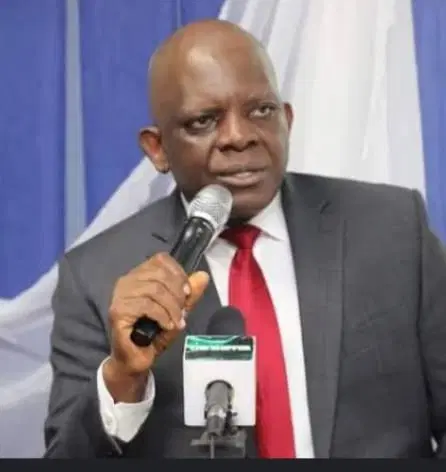
About two weeks ago, the Executive Secretary of the Nigerian Shippers’ Council (NSC), Dr. Akutah Pius reaffirmed the Council’s commitment to its role as the Economic Regulator of the ports, while actively pursuing its transition into the Nigerian Port Economic Regulatory Agency (NPERA).
Dr. Akutah stated this at a sensitization programme, which held in Kaduna, on the online portal for the registration of regulated port service providers and users.
As normal and innocuous as the statement appears, it also triggers an alarm, which reminds one of events leading to the ‘death’ of the precursor of the Nigerian Port Economic Regulatory Agency Bill; that is, the National Transport Commission (NTC) Bill. The NTC Bill was killed at the Presidency by the powers that be, at that time
The NPERA Bill was first passed by the House of Representatives; that is after the tedious legislative procedure. It was later given a concurrent passage at the Senate. From there, it was transmitted to the Presidency, for the all-important assent by the President.
As a maritime media organization, we recall that for many years, the Nigeria Shippers’ Council has been taunted as a toothless bulldog, an ineffective agency that is at the mercy of those it is supposed to regulate.
Created originally to protect the interests of Nigerian shippers, the Council struggled to tame the service providers who exploit shippers. It is true that the Council had tried severally to get the shipping line agencies and the terminal operators to obey the rules of the game in Nigeria. It is true that it has been difficult to enforce its own enabling laws.
Not even the gazette that made the Council to effectively assume the role of the Economic Regulator of the port, could change the perception that stakeholders have about the Nigerian Shippers’ Council.
Desirous of a new beginning, it had pursued the dream of pushing the National Transport Commission (NTC) through. The plan was to get the National Assembly to pass the Bill, the the President to assent to it.
We recall that the NTC Bill had sought to establish the National Transport Commission as a regulator of all activities undertaken in Nigeria’s transport sector. The NTC was primed to operate as an independent regulator to promote multimodal transport and boost private sector participation in the provision of transport services. The Nigerian Shippers Council was being promoted to transmute to the Commission.
However, in 2018, former President Muhammadu Buhari declined to assent to the Bill, which the Senate had passed in March of the same year. The Presidency gave reasons for the decision.
The first official hint that the National Transport Commission Bill was officially dead, and would no longer be pursued came from the current Executive Secretary of the Nigeria Shippers’ Council; Barrister Pius Akutah, sometime in 2024.
At a media parley, Barrister Akutah declared that the Council’s attention is squarely on another legislation, which is aimed at repealing the Nigerian Shippers’ Council Act Cap N133 Laws of the Federation of Nigeria (LFN) 2004, rather than pursuing the controversial NTC bill.
According to its sponsors, the Nigerian Shipping and Port Economic Regulatory Agency Bill 2023, is aimed at repealing the Nigerian Shippers’ Council (NSC) Act Cap N133 Laws of the Federation of Nigeria (LFN) and introducing the Nigerian Shipping and Port Economic Regulatory Agency Act to fully empower the Council for its regulatory role.
Instructively, it is being pushed by the Chairman of the House Committee on Shipping Services, Hon. Abdussamad Dasuki. It is also being solidly backed by the Speaker; Hon. Tajudden Abbas.
While presenting the bill at the lower House, Dasuki highlighted the historical context and emphasized that the government designated the Nigerian Shippers’ Council as the Port Economic Regulator in 2015.
Dasuki had shared insights from the government’s gazette of 2015, emphasizing the objectives of creating an effective regulatory regime for Nigerian ports following their concession. The scope of the regulation covered all port stakeholders, controlling tariffs, rates, charges, and other related economic services.
From all indications, the promoters of the new Shipping Bill, had seen the hurdles which the NTC failed to cross and which led to its premature death, and they are avoiding the hurdles.
The fact is that, the NTC Bill had enemies and was seen as a threat to already existing empires and emperors; they conspired and succeeded in ensuring that it was killed, even before its birth.
Needless to state that, by killing the NTC Bill, Nigeria lost an opportunity to have a well-thought-out professional agency that would have ensured that Nigeria had a semblance of a transport sector that is governed by corporate ethos.
All that is history now, as the new Nigeria Port Economic Regulatory Agency Bill is set to test its luck, and it is our prayer that it scales the hurdles, both at the National Assembly and in the Presidency.
As a maritime media organisation, we are in full support of any law that will usher-in a new life for the Nigerian Shippers’ Council. This is not about relevance, it’s about the prospect of such a law enhancing ease of doing business in the ports and boosting revenue generation for the Federal Government.
Details of the bill indicate that the NPERA will have regulatory authority over all public and private entities operating or providing services in the shipping and port sectors. This includes stevedoring, cargo handling, freight forwarding, haulage, terminal operations, and other related services.
This implies that certain functions of other government agencies operating within the port, such as the Nigerian Ports Authority, the Nigerian Maritime Administration and Safety Agency, and the Nigerian Customs Service, may also be subjected to some regulatory roles under the new Agency We are aware that that these areas of potential conflict have been sorted out, prior to the anticipated Presidential assent.
Unlike those who had contrary views about the creation of a National Transport Commission at that time, we do not think the fears they nursed are necessary under the new NPERA Bill.
The Nigerian Port Economic Regulatory Agency Bill is far more realistic and less contentious than the National Transport Commission Bill. We maintain that if the new Bill sails through, it is going to be to the advantage of all.
As for the Shippers’ Council, it is already gradually metamorphosing from its small enclave of being ‘the protector of Nigerian shippers’, to a more engaged agency; working for a wider spectrum of stakeholders.
Transmuting to the NPERA is in furtherance of its current assignment as the Economic Regulator of the port, so we are totally in support.
If the new Bill sails through and the Council transmutes to the Nigerian Port Economic Regulatory Agency, it then means that the Shippers’ Council will have a new name and a new face. We think the Nigerian maritime industry will be the better for it.
We appeal to the handlers of the President to prioritise the Bill and bring it up for the President’s assent, so that the industry can experience a new lease of life in the quest for ease of doing business.















